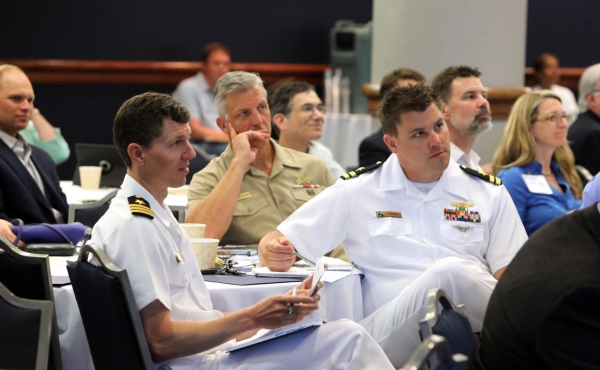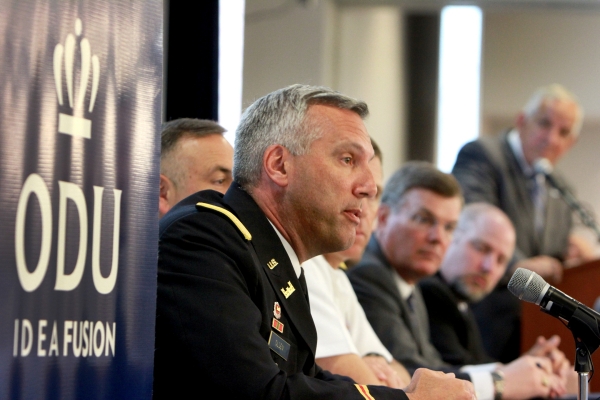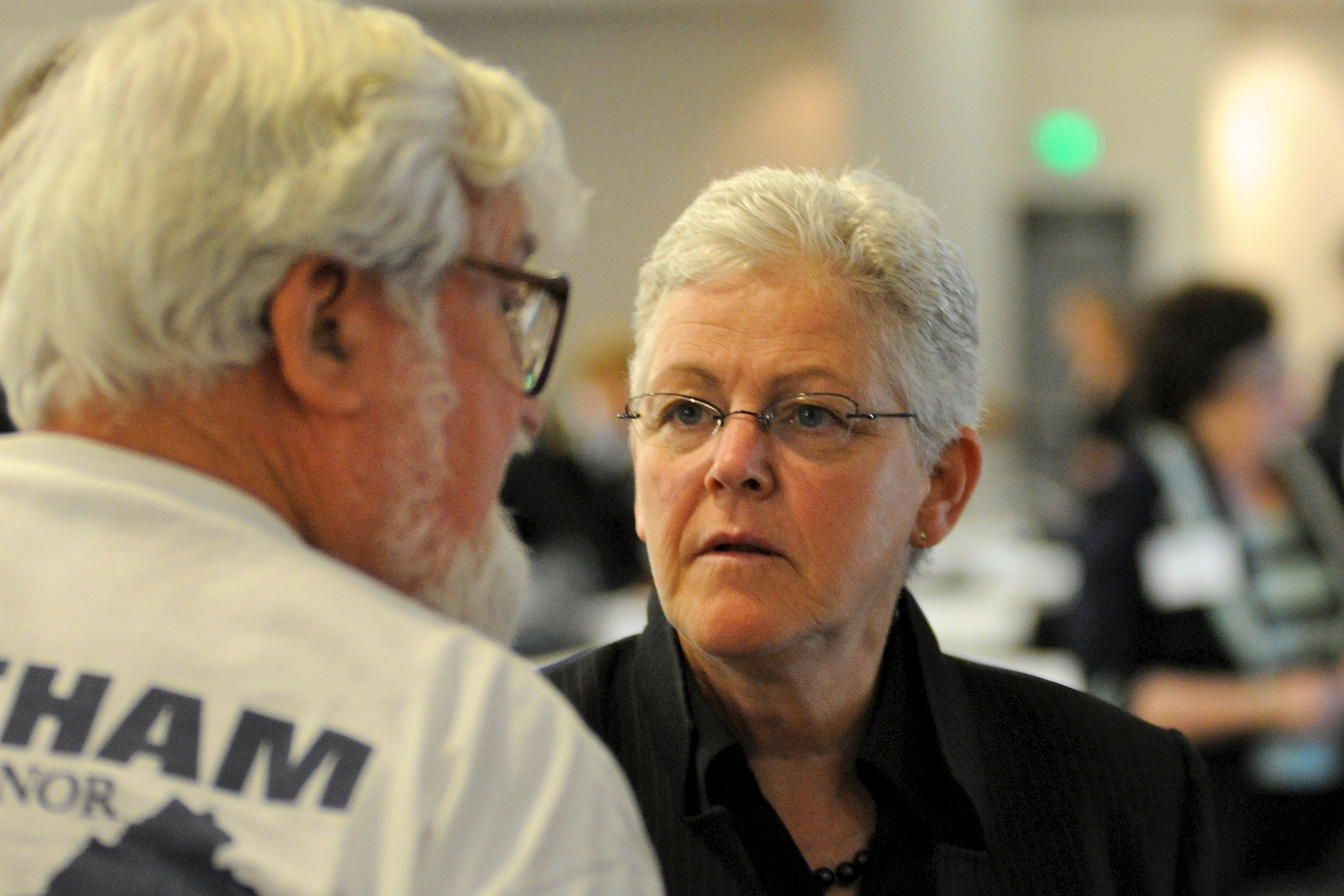EPA Chief, Other Federal Officials Support ODU-Led Pilot Project at TechSurge
June 03, 2014
 Conference attendees
Conference attendees
 Panel discussion led by Pilot Project Leadership Team
Panel discussion led by Pilot Project Leadership Team
 EPA chief Gina McCarthy talks with a TechSurge attendee
EPA chief Gina McCarthy talks with a TechSurge attendee
As a Bostonian, Gina McCarthy knows about the issues that coastal regions face from rising sea levels.
"I live in Boston, you gotta help! All we're doing is moving stuff up higher," McCarthy, head of the U.S. Environmental Protection Agency , said Wednesday to the audience at TechSurge, a conference on national coastal resiliency hosted by Old Dominion University.
The wry remark drew a laugh from the crowd of 250 government and private industry planners who attended the two-day event.
But McCarthy's words, which closed the TechSurge meeting, were also serious in tone to the attendees, who are beginning work to create a comprehensive local response to increased flooding from rising sea levels and climate change that can serve as a template for coastal planners around the nation.
McCarthy related a story she heard from Chris Chambers, a manager in Public Works with the city of Norfolk, about Norfolk's Brambleton Avenue being rendered impassable during a 2009 Nor'easter.
"He told me the road was so bad, people couldn't get to the hospital. He knows this because his wife is a nurse at that hospital. That's not a good sign," McCarthy said.
Her address touched on the plan released by the EPA recently to cut U.S. carbon dioxide emissions - a leading greenhouse gas blamed for global warming - by 30 percent by 2030, and on President Obama's use of executive authority to impose the new regulations.
McCarthy said it's important to realize that issues of rising seas and climate change seem daunting, and can make coastal communities feel powerless. "It can make it feel like the future is beyond our ability to change," she said.
However, strategic thinking and foresight, including things like green infrastructure and floodplain mitigation, can be local solutions that can have a national impact, McCarthy said. And the alternative, not doing anything, is unacceptable, McCarthy said.
"Here in places like Norfolk, and around the country, climate inaction is costing us billions, and these figures are going to be rising."
McCarthy said actions in Norfolk, like moving the heating and cooling system at the Chrysler Museum of Art to the top floor, and raising Brambleton Avenue above the level of the floodplain, are examples of cost-effective solutions that work.
"This city fixed Brambleton Avenue, making it far less likely to flood. This is a small success, but one that should be celebrated," McCarthy said.
The gathering of urban planners and academics and military at TechSurge should also be celebrated, McCarthy said. The leadership of the Hampton Roads region on issues of climate change and sea level rise has attracted the attention of the EPA and the Obama Administration.
"I want to welcome you all to the broader table we have just put out," McCarthy said.
Eric Letvin, the man charged with directing the White House's efforts to reduce the risks of sea level rise in the coastal United States, had told the Techsurge conference on Tuesday that efforts to launch a model flooding mitigation project in Hampton Roads are being watched closely by the federal government.
Letvin, director for Hazard Mitigation and Risk Reduction Policy for the National Security Council Staff of the White House, kicked off the conference, presenting information about the risks posed by sea level rise to millions of U.S. citizens, and billions of dollars of federal, state and local infrastructure. He stressed President Obama's desire for an all-levels-of-government initiative to create a Federal Flood Risk Management standard designed to mitigate against weather events, like Superstorm Sandy, that are expected to become more destructive in the future as sea levels rise worldwide.
The standard is designed to "ensure projects funded with taxpayer dollars will last as long as intended," Letvin said, and conducting future coastal region planning "so that it can quickly recover from a flood event."
Old Dominion tapped into expertise in each of its six colleges four years ago to launch its Climate Change and Sea Level Rise Initiative (CCSLRI). At the TechSurge conference, ODU President John R. Broderick announced the creation of its new Mitigation and Adaptation Research Institute (MARI), which has evolved from the CCSLRI. MARI is designed to be a think tank to develop and support coastal resiliency strategies.
Hans Peter Plag, a professor of oceanography who joined ODU last year and is director of MARI, said ideas to support coastal resiliency come from many different stakeholders.
"Together, we can find an answer to these difficult questions of climate change and sea level rise mitigation and adaptation," Plag told conference attendees. "We are blessed to live where we are. MARI is a place where we would like to ensure we have thriving coastal communities, and not just wait for the next storm-related disaster to occur."
Plag said he envisions MARI as a "one-stop resource linking ODU's faculty and other experts to stakeholders in the region and beyond who need practice-relevant knowledge to develop options for mitigation and adaptation."
The United States Navy has been involved in studying and adapting to climate change and sea level rise for several years, given that its strategic installations, including Naval Station Norfolk, are located in areas potentially vulnerable to rising water levels.
Rear Adm. Kevin R. Slates, director and chief of naval operations for the Energy and Environmental Readiness Division, said the Navy is an eager partner in any initiatives looking for solutions to what is truly a worldwide concern. Slates thanked ODU for facilitating the conference.
"This is not a one person issue, this is all of us working together, to see how we can make this community safer," Slates said in an address on Tuesday. "The coordinated planning approach to increased resiliency is key. I think there are a lot of people looking at this as a great place to model what can ultimately be done in many other coastal regions."
Russell Callender, deputy director of the National Oceanic and Atmospheric Administration (NOAA) and the conferences lunchtime keynote speaker on Tuesday, said that his agency was prepared to act as a "Coastal Intelligence Agency" in gathering and providing data needed for sea level rise response. He said NOAA recently appointed a coastal resiliency coordinator, and, furthermore, will start with the 2014 hurricane season in supplying timely maps showing flooding levels expected from each major storm.
A signature event of this conference occurred during the morning session on Tuesday when David Architzel, the retired U.S. Navy vice admiral who is ODU's director of military affairs, moderated a panel comprised of representatives from each echelon of government and industry in the Hampton Roads region. It is envisioned that the panel will form the basis of Hampton Roads' efforts to support the pilot project.
Ray Toll, a faculty member associated with ODU's Center for Coastal Physical Oceanography, led the effort to organize the broad-based TechSurge conference. "The White House and Pentagon have expressed interest in creating a sea level rise pilot in the Hampton Roads region," said Toll, a retired Navy captain who served as an oceanographer in the military.
"This is in furtherance of the White House National Security Staff's and Council for Environmental Quality's desire to develop a 'whole of government' approach to tackling the multi-echelon preparation for sea level rise."
Toll said ODU will take a lead-integrator role in a unity-of-effort approach that includes federal, state and local governments, and industry in the Hampton Roads area to collectively address sea level rise vulnerability, and measures for adaptation and mitigation.
TechSurge is an outgrowth of a two-year project, "Sea Grant Climate Adaptation 2012: Hampton Roads, Va.-Innovation and Adoption of Adaptation Best Practices," spearheaded by CCSLRI and Virginia Sea Grant. Larry Atkinson, the ODU Slover Professor of Oceanography who was the founding director of CCSLRI, brought together regional experts in engineering, oceanography and planning to lay the groundwork for a coordinated response to increased flooding in the region.
Atkinson said near the close of the conference's first day that he was very happy with the tone and range of the speeches and panel discussions. "It's more than a success, and the fact that Gina McCarthy of the EPA recognized the importance of the conference and asked to be included in tomorrow's program is a clear bonus."
Toll, who serves as ODU's liaison with the Navy and NOAA, said the TechSurge conference has launched a pilot project he envisions as a two- or three-year effort "with the first year focused on base lining our approach and developing the regional template."
The template is expected to include a Hampton Roads Pilot Project Team with representatives from various levels of government, the Navy, U.S. Army Corps of Engineers and industry.

